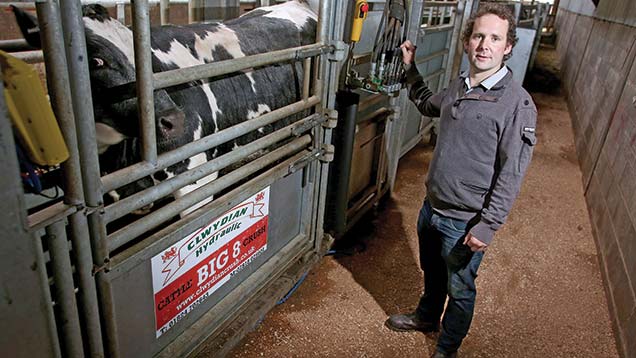Farmers Weekly Awards 2015: Beef Farmer of the Year
 Meilir Jones ©Richard Stanton
Meilir Jones ©Richard Stanton Meilir Jones
Gop Farm, Trelawnyd, Flintshire
The microscopic measuring and monitoring of data by using EID puts Meilir Jones head and shoulders above other beef farmers.
There’s not one area of this business he doesn’t have performance figures for. And it’s the intense scrutiny of data that allows him to improve production efficiency and make a good profit in an area of farming renowned for tight margins.
His use of data means that every stage of the beef finishing process is carefully assessed – and, more importantly, acted on – from the pasture to feed, buildings and breed.
Farm facts
- 69ha farm
- Finishing 1,300 cattle for Morrison’s every year
- Farming Connect Demonstration farm
- Extra income from renewable energy, sheep, livery yard and environmental schemes
See also: More about the Farmers Weekly Awards
Animals are sourced from a handful of markets within a 20-mile radius at 18 months old.
He is mainly buying on frame and favours continental-crosses, dairy-crosses and New Zealand Friesians.
He knows that, just to cover feed costs, animals need to be achieving a minimum daily liveweight gain (DLWG) of 1.1kg.
So by weighing every 20 days through a state-of-the-art handling system, Meilir is able to track growth rates and sell poorer performers before he incurs losses.
“Raising my DLWG average by just 0.1kg equates to an extra £30,000/year,” he says.
Meilir constantly seeking and absorbing information. His unit is a Farming Connect demonstration farm, which means he means he has been able to gather as much information as possible and apply the best bits on his farm by taking part in trials, hosting farm walks and visiting other farms.
Winning ways
- Outstanding cattle handling facility and use of data,
- Strong customer relationship with processor and sources of stock
- Generating added income from green energy, the livery yard and sheep
- Courage and vision to start a business from scratch
He has also developed diversifications, with renewable energy adding £110,000/year to the income pot.
Extra money comes from a livery business, pedigree sheep flock and environmental schemes such as Glastir, too.
But Meilir doesn’t stop at trying to improve efficiency on his own farm. He is also keen to feed information back down the supply chain.
He is currently relaying kill-out information to some of the suckler producers that he sources cattle from.
He hopes by making suckler producers aware of their animals’ finishing performance they will be able to make positive changes on their farm.
In just five years since setting up his farm, Meilir has formed an impressive number of strong relationships in the supply chain, which has led to him selling most of his 1,300 finished cattle to Morrisons every year.
In the past, he has been a member of the NFU Rural Affairs Board and sat on the North Wales TB Eradication Board.
Instinctively, you know that this 38-year-old will not be content to stop at simply making improvements.
He already plans to expand the farm, with the aim of increasing the number of cattle he is buying every week from 25 head to 34.
If he can secure enough land he would also like to look at finishing cattle on a New Zealand-style grassland based system, running the intensive and extensive systems side-by-side.
Finalists
Gary Fitzpatrick and John Toland
Moss Hill Farm, Aghalee, Armagh
Gary and John run the only dedicated calf-rearing unit in Northern Ireland, rearing 5,000 calves a year.
Gary Allis
Furze Hill Farm, Bilsby, Lincolnshire
Switching to a dedicated unit rearing and finishing 1,400 Holstein bulls a year for rose beef has enabled Gary to secure market and expand the business.
Sponsor’s message
“The sustainability of the beef industry is crucial to a business such as ours, and these finalists show how attention to detail in animal performance and financial management can deliver that sustainability”
Connor McVeigh, McDonald’s supply chain director



